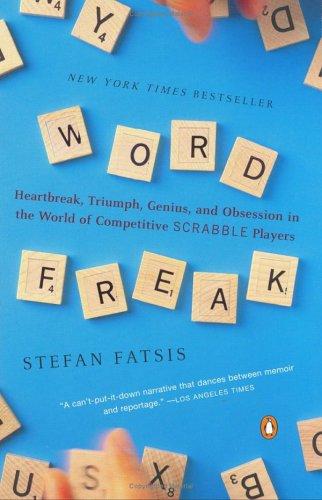Acton reviewed Word Freak by Stefan Fatsis
Review of 'Word Freak' on 'Goodreads'
5 stars
This is a fascinating documentary-style look into the subculture of elite Scrabble players, some of whom I will remember (and worry about) for a long time.
Fatsis also includes an interesting history of the game itself. Invented during the depression by an out of work architect named Alfred Butts, its popularity spread at first by word of mouth, until the orders got to be too much for Mr. Butts, who then turned it over to James Brunot, the man who chose the name Scrabble. (Alfred Butts had called it Criss Cross Words, obviously not as original or snazzy.) James Brunot struggled to make any money until the early 1950's, when a Macy's executive spied the game at a resort and was irritated to learn that he couldn't find it anywhere. When Macy's started carrying the game, it became a sensation, and James Brunot, who employed about three dozen people to churn out these sets in an old schoolhouse, gave up and turned the operation over to Selchow & Righter, a family-owned company that eventually sold it to Coleco. When Coleco went bankrupt, Hasbro bought the game and all their other assets. Scrabble went from being the jewel in the crown of Selchow & Righter to being a mere blip in the profits of humungous Hasbro.
The author also has much to relate on the history of the Scrabble players themselves--where the game caught on, the tournaments, the parks, and their eccentric, evolving rules. And the way they study! These players are mostly obsessive-compulsive geniuses who have come up with incredible insights into how to study anagrams, what collections of letters will yield the greatest number of bingos (or bingoes, better yet), and these lists are organized in ways that go beyond the imagination of most people.
Speaking of obsessive, I should mention that when Alfred Butts invented this game, he made a painstaking, laborious study of letter distribution. In the late 1920's, way before computers, we all know what this means: he counted each and every letter in a variety of books and periodicals. And evidently, he didn't go blind. Stefan Fatsis regards Butts as a hero.
While working on this book, Stefan Fatsis becomes a bit obsessed himself. That's another part of this story, how he almost goes native and captures some of these close encounters with the Scrabble world.
I highly recommend this, definitely a good read.

